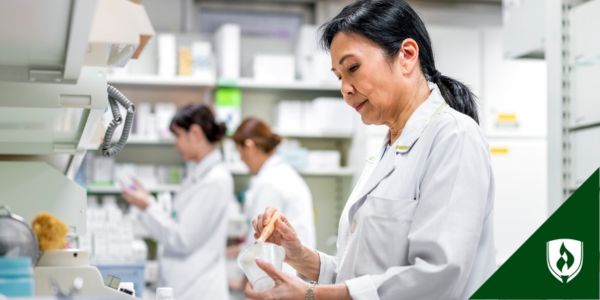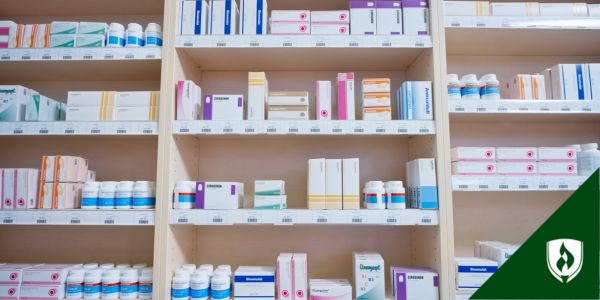
If you’re thinking about working in a pharmacy, you might picture yourself working at a busy store like CVS® or Walgreens®. That’s where many people start, but pharmacy techs can do so much more than count pills at a retail pharmacy.
Today, pharmacy technicians are needed in all kinds of places. You’ll find them working in hospitals, clinics, mail-order pharmacies, oncology centers, long-term care facilities and even smaller independent or community pharmacies.
Some techs help prepare medicine for nursing homes, while others work behind the scenes with online pharmacies, making sure patients across the country get the right medications.
According to Dr. Hassaan Shaikh, instructor in the Pharmacy Technician program at Rasmussen University, pharmacy techs in hospitals “handle IV compounding, medication delivery to patient units, and sterile preparations” that are critical for patient safety. In cancer centers, techs might even help with preparing chemotherapy, which requires a special skill set and lots of attention to detail.
No matter where you work, every pharmacy setting gives you a chance to learn something new and make a real difference for patients. The pharmacy world is bigger—and more interesting—than you might think.
1. Personalized and precision medicine on the rise
Every person’s health is unique, and so are their medications. That’s why personalized medicine and precision medicine are becoming a bigger part of pharmacy work. Instead of using the same treatment for everyone, doctors and pharmacists now have more ways to tailor what they offer.
What is personalized medicine?
Personalized medicine means creating a treatment plan that fits each patient’s needs. Sometimes this involves specialty medications for cancer, autoimmune diseases, or other long-term health issues. These treatments often require special handling and close attention.
How pharmacy techs help
Pharmacy techs are a big part of helping patients stick with these complicated plans. You might organize medicines, make follow-up calls, or teach patients and their families how and when to take their medications.
“Techs often make follow-up calls, confirm shipments, and double-check that patients have their anti-nausea meds on hand before starting treatment,” Dr. Shaikh says. This kind of extra support helps patients feel more comfortable and makes sure they stay safe during their treatment.
Why this matters for students
If you become a pharmacy tech, you could be the person who helps a patient through a tough time or makes sure their treatment goes as planned. Your attention and care can make a real difference in someone’s life.
2. Technology is transforming pharmacy work
Technology is changing just about everything in the pharmacy world—including what pharmacy techs do every day. Instead of spending all your time counting pills or filling bottles, you might use barcode scanners, automated dispensing machines like Pyxis® or Omnicell® and even electronic health records to help keep patients safe.
Today, some pharmacy techs work with telepharmacy tools, connecting with patients by video in places where there isn’t a local pharmacy nearby. In these situations, pharmacy technicians help gather information, confirm patient details and organize prescription requests, but any questions about medications are always handled by the pharmacist. These digital tools make it easier for patients to access care, no matter where they live.
“These systems can flag potential issues before they happen, which makes the work safer and more interesting,” Dr. Shaikh says. With more tasks handled by technology, pharmacy techs spend less time on repetitive jobs and more time helping patients and working directly with the care team. This makes your work not only more important but also a lot more rewarding.
3. Pharmacy techs as key members of the healthcare team
Pharmacy technicians aren’t just helpers behind the counter—they’re important members of the healthcare team. Every day, techs work side by side with pharmacists, nurses, and doctors to make sure patients get the right medications and the best care.
Working together with healthcare professionals
In hospitals and clinics, pharmacy techs might prepare IV medications, deliver medicine to different units, and help keep everything organized for patient safety. They also help check medication orders and watch for any mistakes before they reach a patient.
“Hospital pharmacy techs are part of a team that directly impacts patient outcomes,” Dr. Shaikh explains, “where attention to detail can literally save a life.” This teamwork means pharmacy techs see how their efforts truly help people.
Supporting patients with chronic diseases
Pharmacy techs also play a key role in supporting patients who have long-term health issues, like diabetes or heart disease. Techs often help with patient education by explaining how to use pill organizers, reviewing refill dates or showing patients where to find important information on their prescription labels. If a patient has questions about side effects, drug interactions or how a medication works, pharmacy techs will always connect them with the pharmacist for expert advice. This teamwork helps make sure every patient gets the right support and stays on track with their treatment.
Being visible and valued
No matter where you work, pharmacy techs are trusted by patients and healthcare providers alike. When you take your job seriously, others will notice—and you’ll be part of something bigger than just filling prescriptions.
4. The push for better medication adherence
Making sure patients take their medicine the right way—and at the right time—is a huge part of pharmacy work. This is called medication adherence, and it can make a real difference in the effectiveness of their medication and overall treatment.
Helpful tools for staying on track
Pharmacy techs use many tools to help patients stick with their treatment plans, such as:
- Medication synchronization (med sync): Lining up all prescriptions so patients pick up their medicine in just one trip..
- Blister packs: Packaging that sorts pills by day and time, making it easier to remember each dose.
- Reminder calls and mobile apps: Techs can call patients or use apps to send reminders about when to take or refill medications.
Dr. Shaikh explains that services like med sync “line up all medications so patients only need to make one trip each month.” Many patients feel relieved knowing they won’t miss a dose or run out of medicine.
Using both technology and the human touch
It’s not just about apps and packaging. Pharmacy techs can also make a big difference by checking in with patients, reminding them about refills, or helping them understand when their next pick-up is due. Techs can answer questions about things like store hours, refill status or how to use tools like blister packs, though, any questions about side effects, medication changes, or drug interactions are always directed to the pharmacist. This type of personal attention helps patients feel cared for and encourages them to stay healthy.
5. Reducing drug costs and improving access
Many patients worry about how much their medications will cost or whether they can even get what they need. Pharmacy techs play an important role in making medicines more affordable and easier to access.
How pharmacy techs help patients save money
There are several ways pharmacy techs can help patients with drug costs:
- Suggesting generic options when available, which are usually less expensive than brand names
- Finding and applying manufacturer coupons or discount programs to lower out-of-pocket costs
- Helping with insurance questions and checking if a patient’s medication is covered
- Enrolling patients in assistance programs if they need extra help affording their prescriptions
“Techs don’t just fill prescriptions, they fight for access,” Dr. Shaikh says. If you work as a pharmacy technician, you might also help patients with paperwork, look for savings, and make sure patients get the treatments they need.
Making a difference in affordability
By taking these extra steps, pharmacy techs can save patients hundreds of dollars and make sure no one goes without important medicine. If you like solving problems and helping others, this is a part of pharmacy work where you can make a real impact.
6. How community and independent pharmacies make a difference
Not every pharmacy is part of a big chain. Community pharmacies and independent pharmacies play a special role in the healthcare system, offering personalized care and a better patient experience for people in their neighborhoods.
Building relationships and trust
In these smaller pharmacy settings, you might see the same patients and families each week. Many pharmacy techs in community pharmacies get to know people by name and even learn their health stories.
“At an independent pharmacy, you often know patients by name,” Dr. Shaikh says. “Independents often go the extra mile.”
Offering specialized care and unique services
Pharmacy techs in community and independent pharmacies may do more than just fill prescriptions. Some common services and offerings include:
- Delivering medications to patients who can’t come to the store
- Compounding (making special medicine blends for unique patient needs)
- Organizing home visits for medication reviews and support
- Focusing on personalized care by answering general questions about information on the manufacturer’s label and helping patients with tasks like understanding pick-up times or how to store their medications
Making a local impact
Working in a community or independent pharmacy means you can truly be part of a patient’s care team. Techs in these pharmacies help improve access, support better health and build stronger, healthier communities one patient at a time.
7. The expanding world of specialty pharmacy
The pharmacy landscape is changing fast, and specialty pharmacies are one of the most exciting places to work. These pharmacies focus on specialty medications: complex, high-cost drugs used to treat cancer, autoimmune conditions, rare disorders and other chronic diseases.
What do pharmacy techs do in specialty pharmacy?
Working as a pharmacy tech in specialty pharmacy means you’ll have advanced responsibilities. Here are some of the important services you might help provide:
- Coordinating shipments of specialty medications to make sure patients get their treatments on time
- Educating patients and caregivers about information found on the manufacturer’s label for specialty drugs, such as storage or handling instructions
- Handling paperwork and approvals with insurance companies or pharmacy benefit managers
Dr. Shaikh highlights, “Techs spend hours coordinating shipments, checking adherence, educating patients on how to manage side effects.” This extra effort means patients can stick to their treatment plans and stay as healthy as possible.
A rewarding path for pharmacy techs
If you want a pharmacy career where you can truly make a difference in patient care, specialty pharmacy is a great option. You’ll work on the front lines of new treatments, support people through tough challenges and become an expert in one of the most dynamic parts of the pharmaceutical industry.
Exploring the future of pharmacy technician careers
The future of pharmacy is bright—and it’s changing quickly. New pharmacy trends are opening doors for pharmacy techs to do more than ever before. As the pharmacy industry evolves, so do the jobs and responsibilities available to you.
New roles and growing opportunities for pharm techs
Today’s pharmacy techs aren’t just counting pills. “Techs can be trained to give vaccines, assist with point-of-care testing, and help with medication therapy management,” Shaikh says.
In many places, you can:
- Give vaccines to patients, helping prevent diseases in your community
- Assist with point-of-care testing, such as flu or strep tests, right in the pharmacy
- Support medication therapy management by working closely with pharmacists to check for drug interactions and monitor patient progress
- Work in telepharmacy, supporting patients in remote areas by gathering information, confirming prescription details and answering general questions about the information on the manufacturer’s label while pharmacists handle all medication counseling and advice
These advanced services make pharmacy work more interesting and meaningful.
Tips for future pharmacy techs
If you’re interested in a pharmacy tech career, stay curious and keep learning. Build your technical skills—like using new technology—and your people skills—like communication and teamwork. Try different pharmacy settings, from retail and hospitals to specialty and community pharmacies. The more you explore, the more opportunities you’ll find.
The pharmacy field is always expanding. With new trends, technologies and clinical roles, you’ll have the chance to build a career that’s exciting and full of ways to help others.
So if you thought pharmacy techs just worked behind a counter at your local drugstore, now you know there’s a lot more to it.
If you’re curious, willing to learn, and want a job where you can see the difference you make, this is a great field to consider. There’s no single path, and new opportunities are popping up all the time. Wherever you start, you’ll be building skills that matter—and helping people along the way.
Take a look at Pharmacy Technician Training: A Sneak Peek at the Road Ahead to see what it takes to get into this role.
1CVS® is a registered trademark of CVS Pharmacy, Inc.
2Walgreens® is a registered trademark of Walgreen Co.
3Omnicell® is a registered trademark of Omnicell, Inc.
4Pyxis® is a registered trademark of Carefusion.




